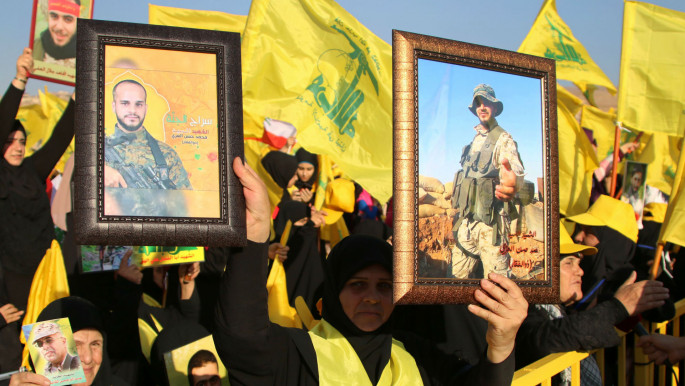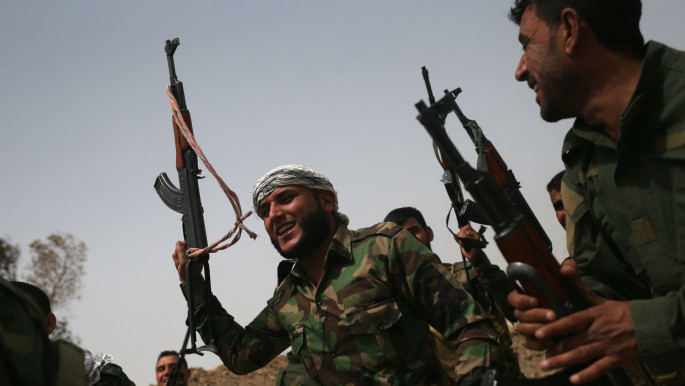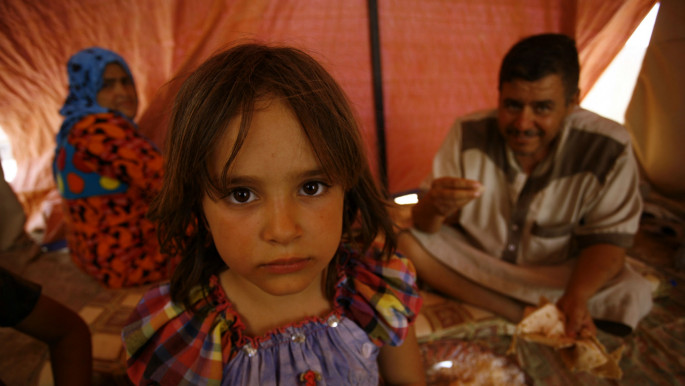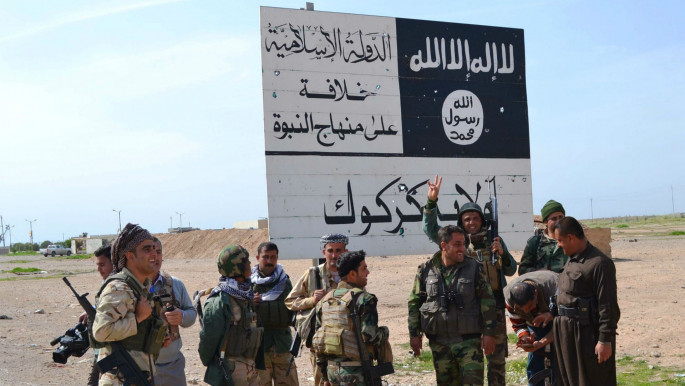The Iraq Report: Iran's allies splinter over IS deals
The Iraq Report is a new weekly feature at The New Arab.
Click here to receive The Iraq Report each week in your inbox
Iran's network of allies across the Middle East have come to public blows over a deal the Lebanese Shia Hizballah group cut with the so-called Islamic State over a week ago to transport hundreds of the Sunni militants to Iraq. Hizballah's agreement with IS has led to widespread criticism from its allies, especially Iraqi Shia militants who feel that they have been betrayed.
Meanwhile, Iraq is preparing to move on Hawija in a battle that could have far-reaching political and military consequences. Hawija lies in Kirkuk province which will soon take part in the Kurdish independence referendum, despite deep objections from regional powers, Baghdad and the province’s ethnic Arab and Turkmen communities. The results of the battle are likely to set the foundations for further future conflict.
Hizballah 'treating Iraqi Shia as cannon fodder'
Iraqi politicians and media personalities linked to Shia Islamist militant groups have accused an array of Iranian allies and proxies – nominally all part of the same axis as the Iraqis – of treating them in a high-handed manner and considering them expendable following a deal Hizballah cut with IS.
Following a week-long offensive by the Lebanese army backed by Hizballah at the end of August – which failed to decisively defeat IS militants on the Lebanese-Syria border – the Shia Islamists came to an understanding with IS. Rather than fight to the death, IS agreed for 318 fighters to be transported across territory held by the Syrian regime to Iraqi territory in "air-conditioned buses".
 |
|
| A rally in Baalbek to celebrate the return of Hizballah fighters after fighting a week-long offensive against the Islamic State on Syria's side of the Lebanese border. [AFP] |
This triggered widespread, cross-sectarian outrage in Iraq. Iraqis – whether Sunni, Shia, Yazidi or Christian – have suffered extensively at the hands of the extremist militants, and the conflict to dislodge them from territories has led to even greater agony.
Iraqi Prime Minister Haider al-Abadi came out swinging a week on Tuesday, terming the deal as "an insult to the Iraqi people". Abadi accused his allies of operating a double-standard, arguing that while his government kills IS fighters and prevents them from going to Syria or Lebanon, the opposite seems to be the case from Hizballah and Syrian President Bashar al-Assad.
In a televised exchange between Hizballah loyalist Faysal Abd El Sater and Dijlah TV host Adnan al-Taee last Wednesday, Taee slammed Hizballah for treating Iraqi Shia like "cannon fodder".
"You sent to Iraq 318 terrorists, suicide bombers, who could kill our youth", an audibly infuriated Taee told his Lebanese guest who said that "300 extra Daesh fighters would not have any effect on Iraq which already has thousands [of IS militants]".
"You in Lebanon feel yourselves as superior [to the Iraqis], Syria also feels superior. You both think that Iraq has to be at the tail end of the convoy", Taee shot back. "You and Iran send us consultants who sit in air-conditioned rooms, while it is Iraqi soldiers who do the fighting."
"We kill IS fighters so that they do not reach you [Syria, Lebanon] and instead you send them over here…The problem is that Iraqi Shia blood has become cheap in the region".
 |
|
| Volunteers from the Shia Badr Brigade cheer after an exchange of fire with IS fighters in Anbar Province, Iraq. [AFP] |
Designated 'Shia terrorists' take hold of US military gear
While Iraqi Shia militants feel betrayed by Iran, Hizballah and the Assad regime, they are receiving succour from a seemingly unlikely source.
The New Arab has seen evidence from both US and Iraqi sources that advanced American weapons are falling into the hands of US designated terrorists. Extremist Shia Islamist factions – including Kataib Hizballah and the notorious Badr Organisation – have been spotted smiling and posing next to M1 Abrams tanks that should be under the command and control of the Iraqi army only.
The M1 Abrams is America's most advanced main battle tank, and is fielded by many countries in the region, including Saudi Arabia, Egypt, Kuwait and others. In Iraq's case, all US military equipment was supposed to be destined for the use of strictly vetted Iraqi army units. Yet its use by Iran-linked Shia groups who have been accused of widespread human rights abuses and atrocities against Iraq’s Sunni Arabs has raised eyebrows.
Although the Iraqi army has denied allegations that it has "loaned" these advanced weapons to groups designated as terrorists by the United States, commanders from the pro-Iran Popular Mobilisation Forces have confirmed to The New Arab that the Shia militants had indeed seized M1 tanks from fleeing IS fighters, as well as being given them by the Iraqi army.
A State Department official confirmed that "not all US-provided defence articles are under the control of the intended recipient ministry/unit…The United States has not provided these or other defence articles to the PMF".
This will be of concern to many Iraqis as well as policymakers and security experts. The idea behind training and equipping specially vetted units in the Iraqi army was to ensure that these units could form an effective backbone to a wider military that would not be overpowered by militias who harbour political ambitions.
However, now that the PMF has been formally acknowledged as a service branch of the Iraqi armed forces and is also indirectly receiving military aid from the United States, its component militias – some of whom are still considered terrorists by the US and others – are equipping themselves with some of the most powerful weaponry on the planet.
While there is no suggestion that the US has intentionally been indirectly supplying these advanced arms to groups it has designated as terrorist organisations, the fact remains that this would be akin to Washington allowing its arms to fall into the hands of groups such as al-Qaeda, Jabhat al-Nusra or even IS.
The result of this continuous flow of advanced weapons technology falling into the hands of groups who are heavily implicated in sectarian war crimes could be even further atrocities backed by some incredibly heavy firepower.
 |
|
| An iraqi family poses for a photo in a tent at a makeshift camp for internally displaced persons (IDP) in Ameriyat al-Fallujah, south of Fallujah. [AFP] |
Destruction and militias prevent refugees from returning home
The effects of the use of such heavy firepower by the regular army in conjunction with the PMF can already be both seen and felt in Iraq after more than three years of warfare that has displaced millions of Iraqis, mostly in Sunni Arab dominated provinces.
Although Baghdad has managed to recapture much of the territory once held by IS, internally displaced persons from those regions are hesitant to return to their homes, blaming mass destruction and sectarian Shia militias for a lack of security and opportunity to resume their lives with any measure of normalcy.
One IDP from Fallujah, Omar Jasim, told The New Arab that he fears returning to his hometown despite it having been recaptured by Iraqi forces and allied PMF militants since June 2016.
"Lots of young boys and men were killed in cold blood at the hands of the [Shia] militias that control Iraq to this day," Jasim said, stating that their presence prevented him from returning home. The Fallujan recounted how he and his friends were ambushed by Shia militias as they were heading back to Fallujah from studying at university in Baghdad in 2013. A farmer managed to conceal him, but three of his friends were not so fortunate. They were later found dead, bearing marks of brutal torture.
Fallujah itself was subjected to extensive aerial and artillery bombardment since early 2014, destroying much of the small city's infrastructure and causing extensive destruction to civilian homes and municipal buildings. Many people fled to refugee camps outside the capital, but were denied entry into Baghdad itself due to "security risks", leading many to accuse the government of abandoning its citizens.
Similar problems are being faced by the people of Tal Afar, recaptured by Iraqi forces and the PMF just over a week ago. For nine consecutive days, IDPs from the northern Iraqi city have been camping in the desert with their families. Social media users released photographs of children sleeping in the desert, some bloodied while others attempted to rest with garbage strewn around them.
Shia militias receive direct support from the Iraqi government and are a key component in Baghdad’s war against IS. However, they have been repeatedly accused of committing grave abuses, atrocities and sectarian war crimes by Human Rights Watch, Amnesty International and the United Nations.
 |
|
| Iraqi Kurdish Peshmerga fighters stand next to an Islamic State group sign at the entrance to the northern Iraqi town of Hawija in 2015. [AFP] |
Hawija and the future of Kirkuk
Now that the battle for Tal Afar has been won, the Iraqi government has set its sights on Hawija in Kirkuk province. However, the fight for Hawija is unlikely to be as easy as Tal Afar was, and the results of the battle may have an impact on any independent Kurdish state as the referendum steams ahead.
The Iraqi army fled Kirkuk after IS' surprise onslaught in 2014, leading the Kurdish Peshmerga to take advantage of the situation and to maintain a military presence in the oil-rich city for which the province is named once they had forced IS to withdraw. Although Kirkuk is nominally under the control of Baghdad, this move gave de facto authority to the Kurdistan Regional Government.
More recently, Kirkuk's provincial council passed a motion to participate in the KRG's independence referendum slated to take place at the end of this month, despite objections by Turkmen and Arab delegates. Hawija, largely Sunni Arab, would therefore be excluded from voting in the plebiscite, while a lack of military presence from both Baghdad and the PMF would mean that nothing would stand in the KRG’s way if it chose to annex Kirkuk.
Baghdad's rush to deploy tens of thousands of men to Hawija may be an attempt by the Iraqi authorities to pressure the KRG to delay the referendum or cancel it altogether, or else risk a potential military confrontation against the Iraqi army and the PMF. Iran has already warned the Kurds that including Kirkuk in any independence bid would be a "move that leads to fresh crises", and therefore this latest military deployment could be a message from Tehran to Erbil to not push its luck too far.
Click here to receive The Iraq Report each week in your inbox





 Follow the Middle East's top stories in English at The New Arab on Google News
Follow the Middle East's top stories in English at The New Arab on Google News


